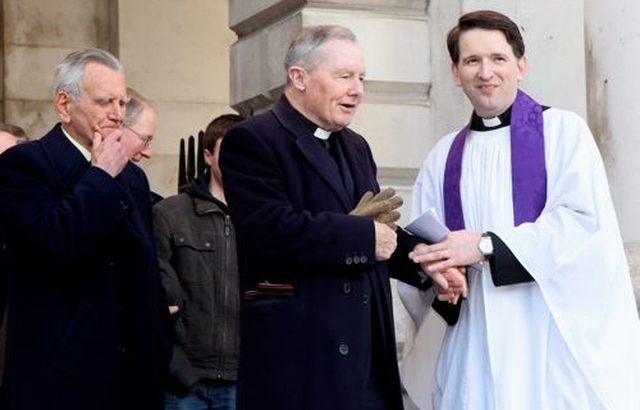Editor’s Comment
Garry O’Sullivan
Prophetic voices are often lauded in the abstract but when they appear in reality they are more likely to be ignored, sidelined and generally scoffed at.
The retiring Dean of St Patrick’s was one of those few prophetic voices in any of the Christian churches on this island — a prophet is not a saint and I’m sure the Dean would be the first to laugh if anyone tried to canonise him.
The role of the prophet is to comfort the afflicted and afflict the comfortable, a role to which Dean Robert MacCarthy had a natural penchant for.
Take the issue of Church Unity for which we set aside a week of prayer annually.
While there may well be lots of goodwill and genuine searching for unity on the ground in the different traditions, at the top the vested interests in each institution ensure that nothing changes and the status quo is maintained.
Praying to God to change men who have made stones of their hearts is looking to the wrong place for change — the power for change in Christian Unity lies among those who are prepared to raise their voices and demand reform using the gifts that God has already given to the community.
Dean MacCarthy complains of the ”inflexibility and inelasticity” of the powers that be in the Church of Ireland, as well as saying that the Roman Catholic Church at official level has not ”given a lead in the ecumenical task”. Ecumenism in Dublin, he said, is years behind other places.
And, of course, he is right. The truth of the situation is that the clericalist mindset that prevails in both the Roman Catholic Church and the Church of Ireland, despite all the rhetoric around unity and understanding, is set against any real change.
Dean MacCarthy says the problem with both Churches is that clericalism is at the root of their ills, the instinct to defend the institution at all costs.
And in dealing with the institutional Church of Ireland, the dean told a packed St Patrick’s on Sunday afternoon last, that it opened his eyes to how ”unchristian the institutional church can be”.
Some in the Church of Ireland, according to the dean, see the abuse scandals as their opportunity to get one up on their larger Catholic rivals — yet if an inquiry was launched into the Church of Ireland and how it has handled abuse claims (and they have had them) would they emerge spotless and gleaming?
If there was one clear example of Christian Unity this week it was down in Union Hall in west Cork.
In fact, it wasn’t an example at all of Christian Unity, it was a unity of different faiths and none.
While an RTE¨ reporter said the people were praying to their different Gods at the end of the pier, in fact Islam and Christianity share the same God.
At the end of a pier, waiting for the bodies of loved ones to be found and brought out of the sea, the pettiness of institutional religion falls away and the reality of life stands there in all its naked truth.
It is desperate that only tragedy and death seem strong enough to bring us together in our common humanity and recognise that Muslims, Catholics and Protestants love their children as much as we do, cry the same tears as we do and respond to compassion and human warmth as we do.
What all religions have in common is the proactive care and reaching out to our fellow man/woman. Perhaps this was why Jesus said we would be judged on this reaching out and not our prayers.
Perhaps next year we should forget praying ‘that they may all be one’ and go out and visit our Muslim/Protestant etc neighbours and make those connections something more than just an annual event.
Some are already doing this, as our front page story this week reports. After all, it was the institutional people in the past who in their Christian ‘wisdom’ banned Catholics from entering a Protestant Church even for the funeral of a close friend. Talk about Scribes and Pharisees tying up heavy burdens.
As Christians stood in solidarity with Egyptians at the end of the pier in west Cork, so too we need to throw off the heavy yoke of institutional clericalism and say ‘enough’.
After all, what institution or Church ever reformed itself from the top down?


 Dean Robert MacCarthy (centre)
Dean Robert MacCarthy (centre) 